#dreamfisher certified
Text
New press archive page reveals some juicy lore secrets

The date of the article is July 28th 1948.

Now we know the official date when Joey Drew Studios was closed: 1948
Which means that Wilson was working at Joey Drew Studios at the time when he made the 414 audio log, since the audio log is from April 1948, and the studio closed in July. This pretty much confirms that Wilson was the Gent worker, who stole Shawn’s toolbelt.
But wait, there’s more! It turns out that Gent took over the studio assets: presumably including the ink machine

And it seems that gent continued to perform experiments with the machine until 1952, when they were finally closed for safety issues.
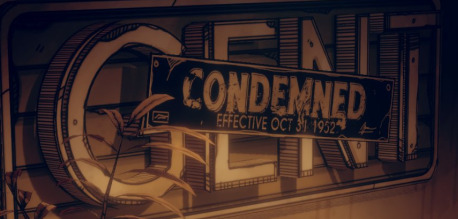
That’s very interesting. it means that Thomas got the ink machine back. Now let’s think back to Allison’s comment about Thomas being upset that someone stole his "dusty old invention”.

We all assumed that invention was the ink machine, and the “someone” was Joey, but now it looks more likely that the thief was Wilson. Was the stolen invention the seeing glass tool? If Wilson has it, then he could have been the person who messed with the golden text in Henry’s cell.
As a reminder to those who haven’t read my post about it: the Employee handbook confirms that the messages were made by two different authors.

As we’ve pointed out before, those three words were written in what appears to be pencil, while the other messages are written with ink. Pencil was also used to cross out the “don’t” in “don’t go through the door”, presumably to encourage Henry to repeat the loop

Of course, we don’t know if all of these details are connected, but to me it looks suspiciously like Wilson might have been the mastermind behind the events in BATIM and Henry becoming trapped in a time loop.
#bendy and the dark revival#batdr#Bendy and the Ink Machine#batim#Henry Stein#wilson#official bendy#dreamfisher certified
494 notes
·
View notes
Text
Every single audiolog in BATDR
Nathan Arch
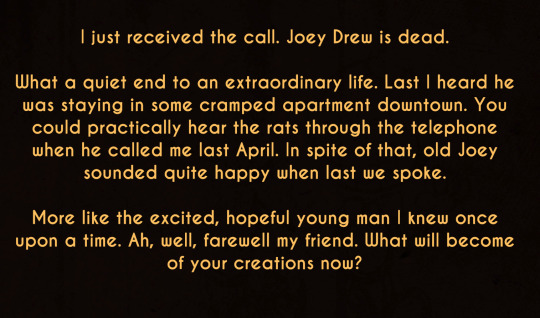
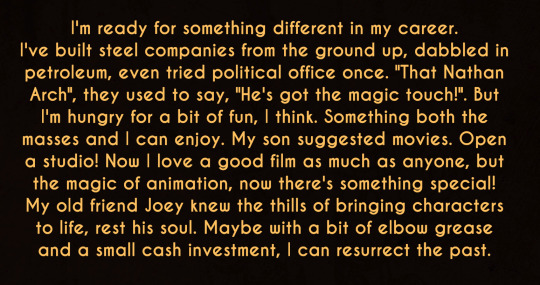


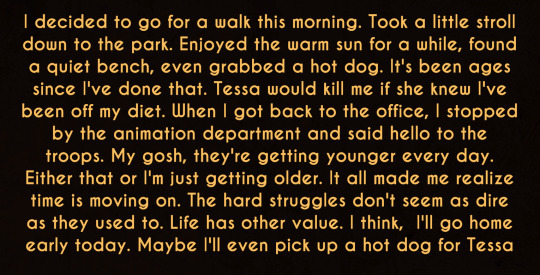
Wilson
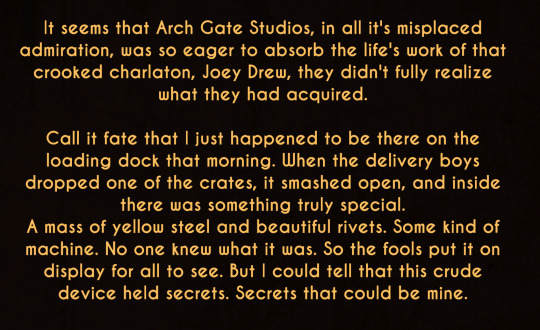



Keepers



Shawn Flynn

Grant Cohen
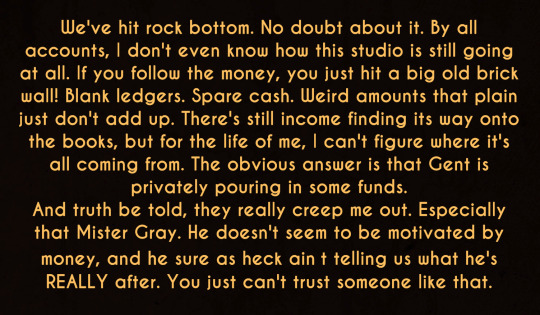
Jack Fain
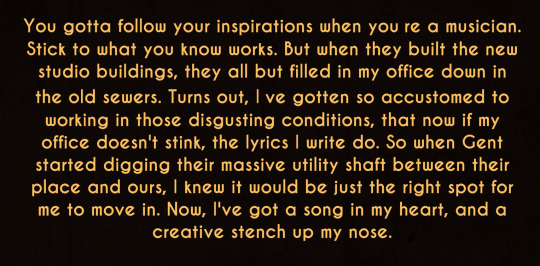
Wally Franks
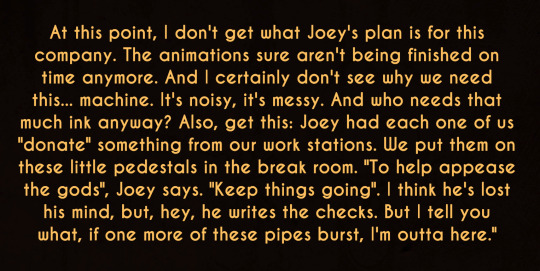
Angus Newman

Dale Little

Kay Lee

Bill Danton
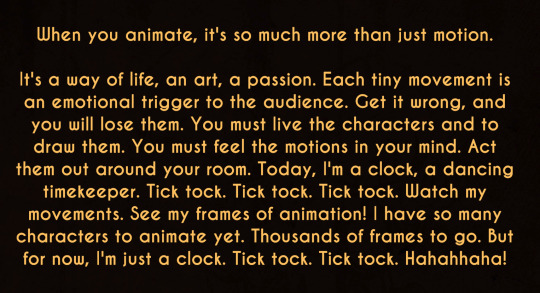
Phil Clark
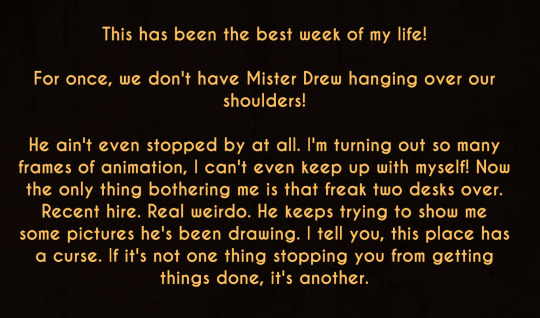
Jane Todd
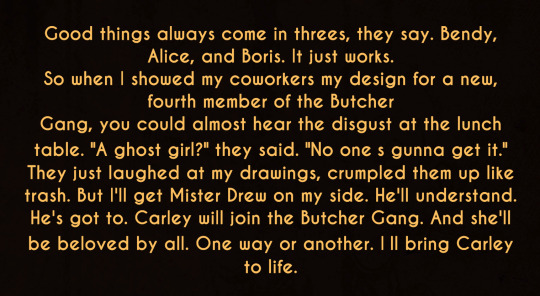
Lance Derby

Hank Scott

Grace Conway

Kitty Thompson
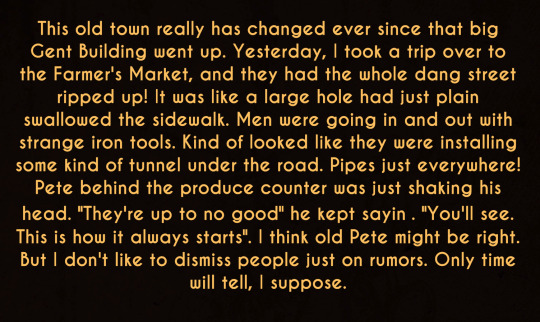
Steve McGregor

Archie Carter
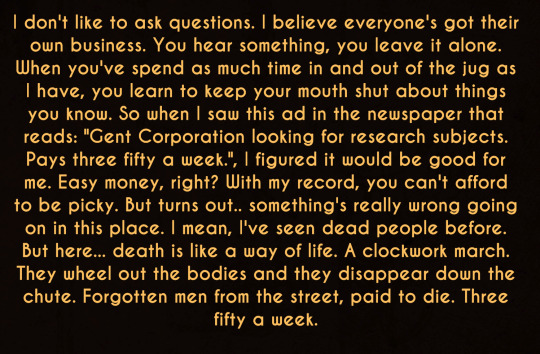
#bendy spoilers#bendy and the dark revival#batdr#official bendy#dreamfisher certified#bendy and the ink machine
403 notes
·
View notes
Note
Have you seen Matpats new theory on Bendy and the Dark Revival?
Yeah, I've seen it.
Alas, it's wrong. I loved the way he managed to make the memory items meaningful and the connection to Tessa is interesting and gives me a lot of thoughts and theories of my own. But Nathan didn't open an animation studio until after Joey's death, and Tessa was still alive at the time. We know this, because he mentions visiting the animators in the same audio log where he talks about bringing the hotdog to Tessa.


And yet... those memory items the way they seem to be tied to Wilson is extremely interesting to me, and I want to propose a different theory: what if the items were never meant to have been Audrey's memories, but rather Wilson's? Not in the sense of Wilson's soul somehow being inside Audrey, but simply because Wilson's mind is affecting the ink world in the same way that Joey's did before?

Remember when I complained that despite being told that Wilson has control over the world, we never saw the same signs of it as we did with Joey (eg. the paintings on the walls being the same as inside his apartment, and some of the writings on the wall clearly referring to him?)

What if the memory items are this to Wilson? Bits of his mind and memories materializing inside the world under his control?
Some more evidence:
The icon for achievement for collecting memories looks like the eye used to symbolize Wilson in the game
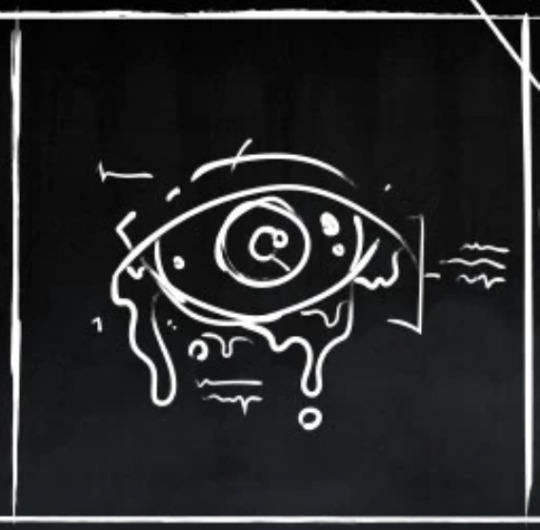

A lot of memory items can be found in places connected to Wilson or Nathan



One of the items mentions roadtrips, but that's unlikely to be a thing Joey did with Audrey, given that he was wheelchair-bound.

And finally, notice that the description on the items is extremely vague about the gender of the child they belonged to.
#bendy and the dark revival#bendy and the ink machine#wilson arch#audrey drew#nathan arch#joey drew#dreamfisher certified#ask
183 notes
·
View notes
Text
Joey Drew Archive 4/4


We finally have the date when Arch Gate bought Bendy IP: 1972. This would be around the time when Audrey got employed and sucked inside the inky world. To recap: Henry visited Joey in 1963, 9 years prior. Meaning that Audrey could very well have been the girl whose voice we hear at the end of BATIM, now all grown up!
The article also confirms what we’ve long suspected: Joey Drew is dead!
Curiously, it states here that Arch Gate Pictures was formed after Nathan bought Bendy IP. This could only mean two things:
The Arch Gate studio, which employed Allison at the end of BATIM, belonged to Nathan’s son, Nate Arch Jr, not to Nathan himself, and for some reason Nathan took over his son’s studio around the time when the steel industry experienced a crisis (if you look at my “dreamfisher certified” tag, you’ll find a post where I go into details about this theory, the hints about we’ve been given so far, and what it could mean for Nathan’s relationship with his son that I hope to see explored in BATDR).
Joey was exchanging letters with Allison from the future
Both are not impossible, though I’m personally more inclined to think it’s the former. This is important, because Nathan and his son share the same first and last name, which means that not every reference to “Nathan Arch” that we’ll see in the game will be about the same person. We’ll have to be very careful to distinguish which Nathan did what. For all we know, they might have a vastly different personality.
#Bendy and the Ink Machine#bendy and the dark revival#batdr#batim#joey drew#nathan arch#arch gate#official bendy#dreamfisher certified
399 notes
·
View notes
Text
Every single memo in BATDR
Your Best Pal
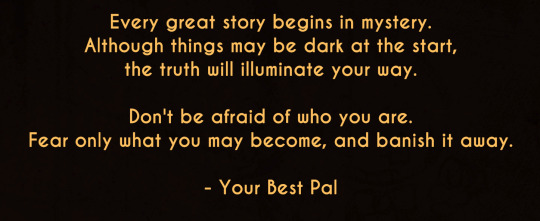
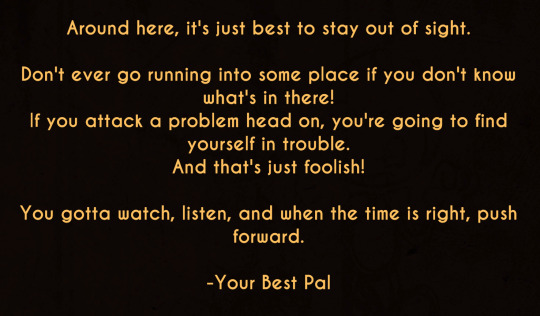
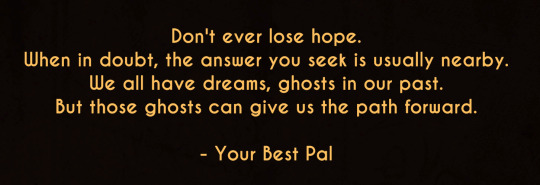
Sammy Lawrence
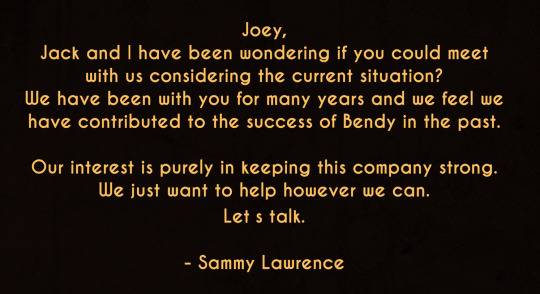

Shawn Flynn

Thomas Connor
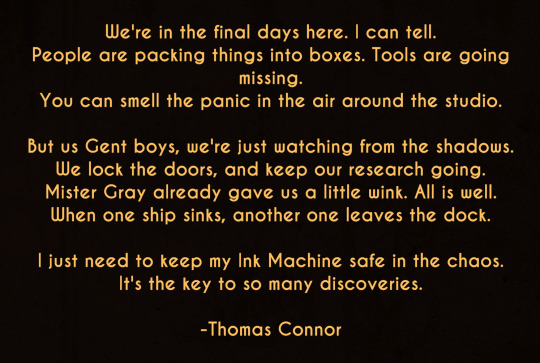
Wally Franks

Joey Drew
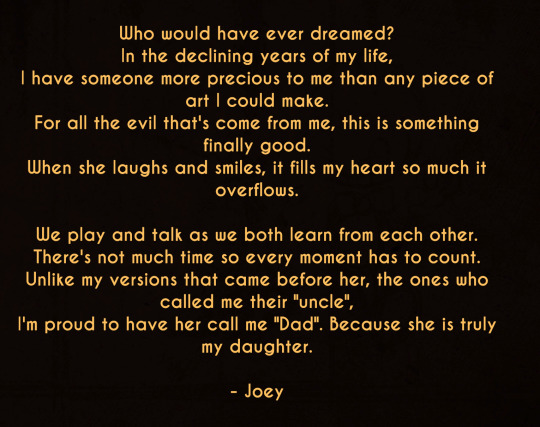
Alice Angel

A Friend (Allison)
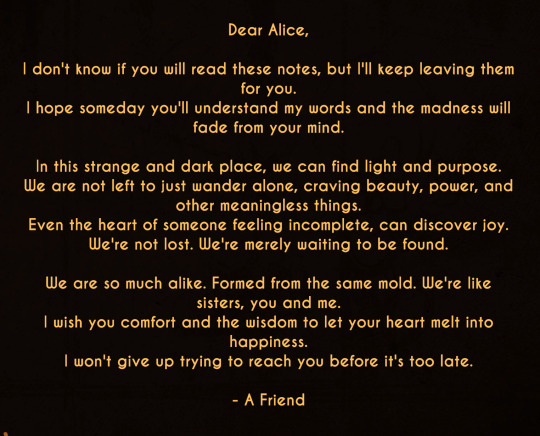
Alan Grey
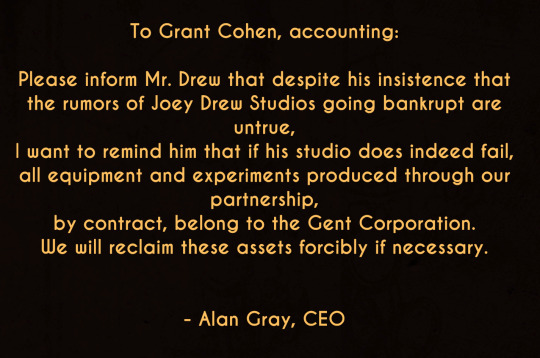
Telly Wester
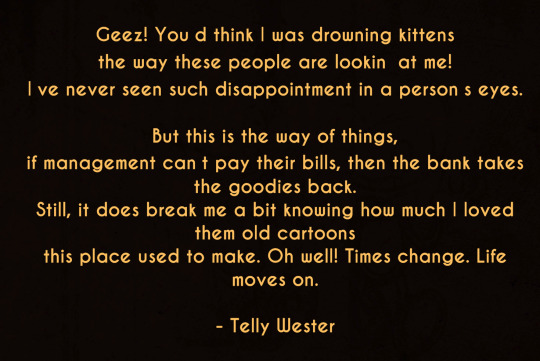
Sally Newt

Hudson Doyle



Chef Buck

Phil Clark

Muncie Dunn

Eugene Lloyd

Kitty Thompson

Unknown
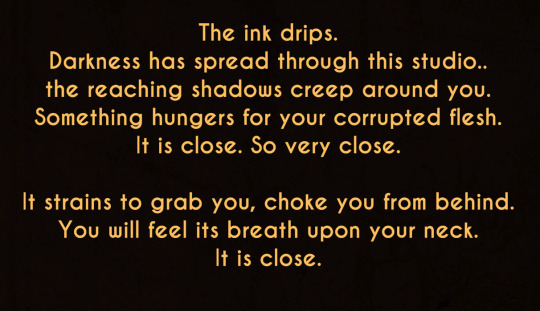

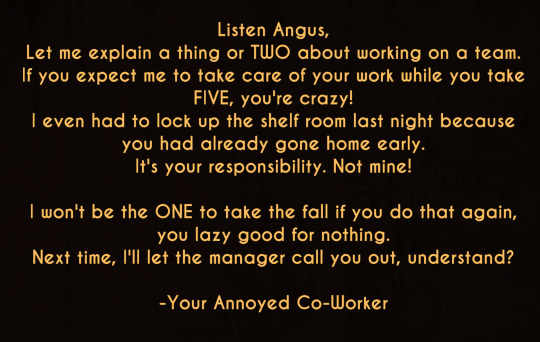


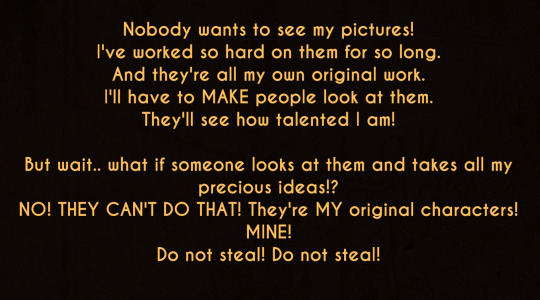

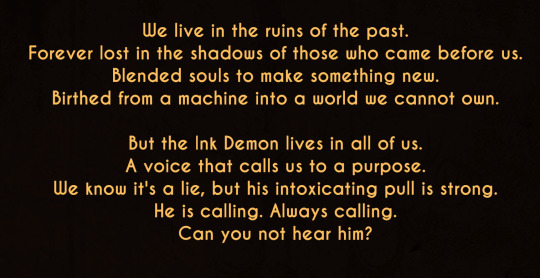
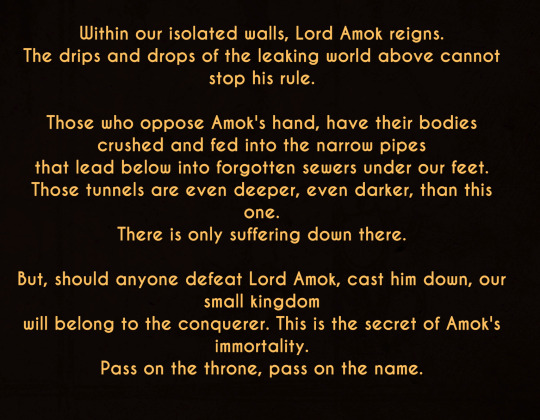
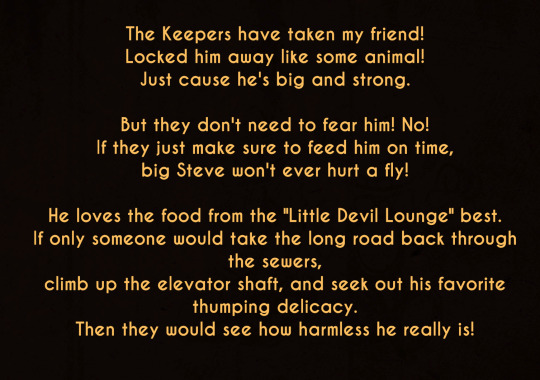
#bendy spoilers#bendy and the dark revival#bendy and the ink machine#dreamfisher certified#official bendy
296 notes
·
View notes
Text
You know how we’ve always said it’s weird that Joey ordered all of his employees to donate an item for the ritual, but there were only 6 pedestals?
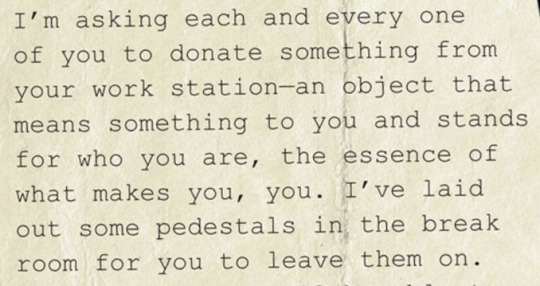
I think I’ve figured out the reason.
So we know that there were 2 studio locations: in the meatpacking district and in the broadway

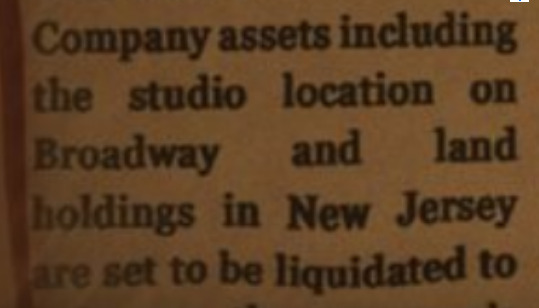
Thing is, only the Broadway location was liquidated, the Meatpacking location was presumably still in Joey’s hands. And Joey invited Henry to visit “the old workshop” meaning the one in the Meatpacking district.
And that leads me to the conclusion that the ritual only had 6 items, because after 1948 Joey only had 6 employees left in the Meatpacking studio location
153 notes
·
View notes
Text
So, I looked up some of Nathan’s quotes from TIOL, and it seems he was still unmarried and looking for a date in 1927, which means that Wilson couldn’t have been born before 1929.
This means that he can’t be older than 45 in BATDR, making him around the same age as Chris Pratt
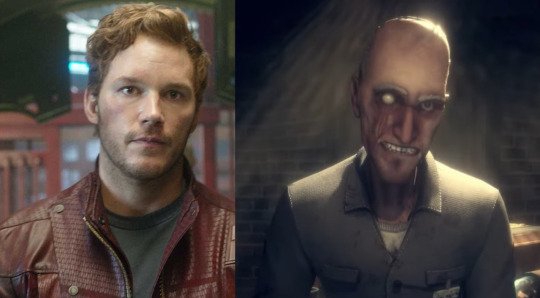
Look how they massacred my boy
Since we’re on the subject of canon ages, given that Audrey wasn’t even born yet as of 1963, and she looks prepubescent in Joey’s slideshow, meaning she was max 12 at her creation, it would make her no older than 21 at the time of BATDR (assuming she didn’t have accelerated aging).
107 notes
·
View notes
Note
nathan has no reason to put up pictures of wilson when he chose to work as a janitor, it wouldnt make sense for there to be pics of the janitor (even if its his own son). there are no pics of tessa either but nathan still clearly cares abt her /nm
Good point about Tessa, but Wilson isn't a janitor, he said in his audio log that janitor is simply one of his disguises.
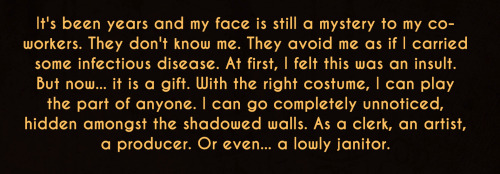
We don't know what his true position is, though I'd imagine it's pretty high, considering that he's the Heir Apparent of the company (person who inherits the company after the current owner's death).
Nathan has been called the "owner" of Arch Gate Pictures and "CEO" of Arch Gate Films, but not both, suggesting that there may be another person, who's the owner of Arch Gate Films and the CEO of Arch Gate Pictures. Also, Wilson uses the term "Arch Gate Studios" in one of his notes.

In the Disney company structure Disney Pictures is a subsidiary of Walt Disney Studios, which is a subsidiary of The Walt Disney Company. If the structure of the company is similar to that of Walt Disney Studios, it would mean that Archgate Films and Arch Gate Pictures are both subsidiaries of Arch Gate Studios, which is itself a part of Arch Gate Company. There would be a different person in charge of each of these companies.
Nathan says that it was Wilson's idea to start a film studio, so it's not impossible that Wilson is the CEO of Archgate Films.
#bendy spoilers#nathan arch#wilson arch#bendy and the dark revival#bendy and the ink machine#dreamfisher certified
72 notes
·
View notes
Text
By the way guys, if you’re wondering where I got the info about Nathan’s son, it’s from the intro of The illusion of living book

Which implies the existence of a Nathan Arch Jr. He also mentions him in passing one time

#Bendy and the Ink Machine#batim#bendy and the dark revival#batdr#nathan arch#nathan arch senior#nathan arch junior#bendy: the illusion of living#dreamfisher certified
97 notes
·
View notes
Text
The man who corrupted Spamton

Wasn’t Gaster

Spamton didn’t get in contact with Gaster until after he lost his success.
Then who was it?


Mike is the TV World’s Gameshow Boss.
3K notes
·
View notes
Text
Kris created the fountain as a call for help?
There’s one interesting thing Kris does right before creating the fountain.

They open the door, presumably for Undyne, who they know is on the way to their house following Toriel’s phone call.
Kris wants Undyne to come inside the Dark World. But why? What is their goal?
Personally, I think it’s their way to call for help. Keep in mind that Kris has an option to ask Undyne for help earlier in the chapter, and her dialogue hints that Kris told her they think the Dark World is a danger to their town.




If Undyne sees the Dark World by herself, she will have to take their warning seriously, right? And even if she doesn’t, Toriel might.
Think about it: if you’re a child in trouble, who are you going to reach out to?
A parent, and a police officer. Toriel and Undyne.
#deltarune#kris dreemurr#toriel dreemurr#undyne#that's assuming you live in a place where you can actually trust the police of course#deltarune theory#dreamfisher certified
1K notes
·
View notes
Text
All lore-relevant notes and spoilers from The Lost Ones book
Spoilers under the cut
Canon characters that appear in the book:
Joey
Thomas
Allison
Wally
Other important characters:
Scott (a GENT worker, Thomas' right hand man who was among the people helping him build the ink machine)
Bill (son of the studio's investor)
Constance (an actress working on a film sponsored by Bill's dad)
Brant (a journalist trying to expose Bill's father as a corrupted businessman)
Major lore reveals:
Thomas and Allison are confirmed to have shady morals. They're working for Joey and actively helping him cover up the murders.

Thomas justifies coming back to work on the ink machine, because he believes it's like his child.

But really, all three of them are most likely mind-controlled by the machine.
The ink is confirmed to have two mind-control abilities: firstly, it causes whoever touches it to become obsessed with the ink machine.


Secondly, it enhances some kind of deeply buried negative feeling or personality trait in the victim.



All ink creatures are confirmed to be connected with the Ink Machine and traveling together with it.

Bendy... can turn invisible?
Together with the ink machine, Thomas transported a giant box with chains on it. Something inside would bang on the walls of the box every time Brant touched the ink machine. When the teens opened the box to see inside it, it turned out to be completely empty and clean, with no ink inside. Bendy attacked them soon afterwards, so it was most likely him inside the box, but it's strange that there was not a drop of ink inside that he could be hiding in.
There exists a way to cure the ink creatures and turn them back into humans (!)
Constance develops an "antidote" which cures Brent after he turns into a Lost One. It's not stated what is inside the antidote, but she created it with the use of an amateur chemistry set, so the ingredients must be simple and easily accessible. It's described as having a deep red color.
The Ink machine isn't really broken and can't be fixed

That would imply that the Creator's Lie is actually that the ink machine isn't working as intended. Though I have no idea for what purpose would Joey intend to create a machine that enhances people's negative feelings.
Other notes:
Tom calls Allison "Ally"
Dot still works at the studio, Joey orders Thomas to hide the ink machine from her
More hints of Thomas being black: he spends his days drinking in bars in a racially-segregated African American neighborhood, and Scott aggressively questions Bill if he's "uncomfortable" meeting him there
Joey's sense of humor continues to be weird. At one point he "accidentally" on purpose shuts the door in Bill's face and laughs about it
The Ink Machine was created in the Atlantic City, which is also the place of the main GENT headquarters and the place where their greatest inventions are created.
Joey wears a pinstripe suit (Dapper Bendy reference?)
Joey's walk is described as resembling a dance (Dancing Demon lol)
#bendy spoilers#bendy and the ink machine#bendy: the lost ones spoilers#bendy: the lost ones#batim#joey drew#thomas connor#allison pendle#dreamfisher certified
124 notes
·
View notes
Text
Hidan actually has… depth???
I’ve been reading the Akatsuki Hiden novel lately, and one of the stories caught my attention. The book is intended to show a gentler, more human side to the Akatsuki, and the story itself - titled “The Valley of Lies” - follows Hidan and Kakuzu, as they come across a “happy” (in a Stepford way) cultist village, and proceed to mercilessly slaughter everybody living there; including a child, who spent a large part of the story bonding with Hidan over his teachings about the way of Jashin.
The first time I read this story, I was confused. How could this heartless display of violence serve as a way to humanize them? If anything, it made them look even worse, Hidan in particular. After repeatedly stating that killing people for money is against his religious beliefs, he doesn’t hesitate for a moment to kill a potential Jashin convert, only because Kakuzu wants to cash in on his bounty.
“Hohozuki was staring straight at Hidan, and suddenly, he appeared to be no different from the other villagers who were scrambling around, trying to escape the sudden invasion.”
What a cruel, nasty little hypocrite, eh?
But then I read the story again, and one scene in particular immediately stood out to me. It opens with Hidan teaching the boy the most important commandment in Jashinism - “Thou Shalt Kill Thy Neighbor” - which is explained as being less about physical distance, and more about murdering any person that you grow emotionally close to; people you most respect and bond with. The boy then asks Hidan how come he hasn’t killed Kakuzu, to which Hidan immediately responds that the rule doesn’t apply to him, because Kakuzu and Hidan are simply too different from each other to ever become emotionally attached. The boy then responds with this:
“That’s right… Hidan-san and… Kakuzu-san… are different… Just like me… and Ameyuki…”
Now, the reason why this scene reads differently the second time around, is because at the end of the story we find out that the boy’s “friend” is, in fact, his own mud clone. The two boys aren’t different at all - they are the same person.
Mind = Blown!
When the boy compares his relationship with his clone to that of Hidan and Kakuzu, he isn’t agreeing with Hidan’s explanation. He’s recognizing it as an excuse, a lie that Hidan tells himself, because the truth makes him uncomfortable. Much like the boy, Hidan is living in his own “valley of lies”, which is lampshaded early in the story, where he comments on the fact that the cultist village’s philosophy reminds him of his own faith in Jashin.
This is what the Databook has to say about Hidan’s relationship with Kakuzu:
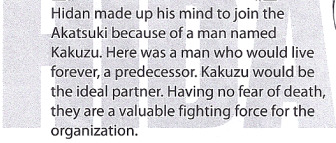
Kakuzu is the first person Hidan has met in his life, that he could in some way relate to. Hidan is used to being one of a kind - the only killer in a village of pacifists, the only Jashinist who’s achieved immortality - and Kakuzu is the only person in the world, that Hidan could build a genuine connection with. But he doesn't acknowledge that connection, either to the boy, or even to himself, because he knows that if he were to ever allow himself to bond with Kakuzu, his religion would compel him to kill the man, which is something that he very obviously doesn’t want.
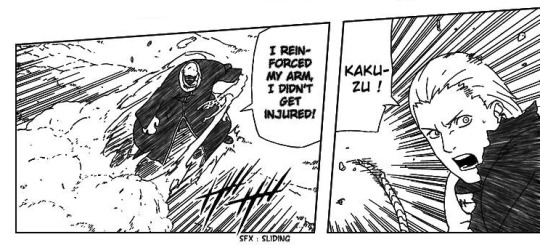
“Hey, what the fuck, man!? Is Kakuzu gon’ be okay!?” - actual quote from the story. For a person, who supposedly doesn’t feel any attachment to Kakuzu, Hidan sure panics a lot whenever Kakuzu appears to be in genuine danger.
So many people take their bickering at a face value, and assume that they feel nothing but hate towards everyone and everything, themselves included. And I can hardly blame them, seeing as much of the nuance to Hidan and Kakuzu’s characters and their relationship is scattered between databooks and novels, that nobody reads. But it’s really fascinating to see that there may be more to them than meets the eye. It’s a shame that the anime didn’t choose to adapt any of this.
#naruto#hidan#kakuzu#kakuhida#naruto shippuden#anime#akatsuki#yes i'm into Naruto now#anime theory#akatsuki hiden#dreamfisher certified#theory
2K notes
·
View notes
Text
Nathan's relationship with his son
The one thing that TIOL and Crack-Up Comics beat into our heads is that Nathan’s business is strictly in steel and oil, not in entertainment.



Nathan didn’t begin to dip his fingers in the entertainment business until he bought Bendy after Joey’s death.
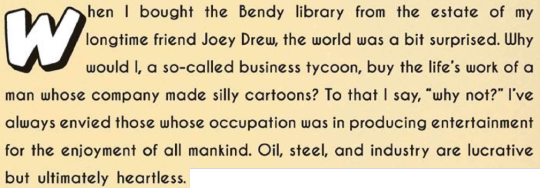
So then how the hell is Arch Gate Films - a studio named after him - open all the way back in 1963, when Joey’s still alive?

The simplest explanation is that Arch Gate used to belong to his son, Nathan Arch Jr.
We can use this fact to infer some things about Nathan’s relationship with his son. The fact that Nathan suddenly took over as the CEO of Arch Gate in the 70s is baffling - why would young Nate Jr step down as the CEO and give the position to his elderly father? Assuming that he’s still alive, it’s more likely that he was forced to step down.
It’s worth noting that in the 1973, merely a year after Nathan changed the direction for his business, both steel and oil were going through major crisis:

Nathan had been in this industry for a very long time, so it’s likely that he noticed the market becoming oversaturated, and correctly predicted that it would lead to trouble for his company very soon. It makes sense that he would look for a new direction to take his investments. Taking over his son’s successful studio would’ve been a logical, though very cruel, move on his part.
It’s also worth noting that even after taking over Arch Gate, Nathan expresses his hatred for the “creative types”:

If Nathan’s son was running a film studio, he was likely a creative person himself. And since Nathan looks down on creative types, he probably saw his son as a major disappointment.
Another, more intriguing possibility, is that Nathan became the head of Arch Gate because his son died.
This would open up the possibility, that he may have bought Bendy’s IP, because he wanted to use the ink machine to bring Nate Jr back to life.
Notice that he compares his feelings for his son to Joey’s feelings for Bendy:

Joey was obsessed with bringing his “son” to life. If Nathan feels as strongly about his own dead child, he would probably want to bring him back to life as well.
#Bendy and the Ink Machine#batim#bendy and the dark revival#batdr#nathan arch#nathan arch junior#nathan arch senior#bendy: the illusion of living#dreamfisher certified
165 notes
·
View notes
Text
Queer Subtext in The Illusion of Living - Part 5/5
It’s time to address the elephant in the room: Henry.
Joey tries very, very hard to ‘no homo’ his relationship with the man:
“His presence was helpful, I can happily admit, but his absence was even more so. Not having him at the studio ended up being one of the best things that could have happened to it. Of course, the funny thing is, I couldn't have not had him without having him in the first place. Just like you can't appreciate the light if you haven't spent time in the dark, so too does a person's absence become clear only if he has been around.” TIOL, page 154
“A letter from Henry. You might not think I'd keep such a thing, but I do. I have no ill will toward the man as you know. Him leaving, as I said, was the best thing that could have happened to the studio. His letter reminds me of that.” TIOL, page 218
The lady doth protest too much, methinks.
The only hint we get regarding Joey’s true feelings for Henry is the following note by Nathan:
“NateA: Joey has always been a professional person, far more so in many ways than me. That is why this section of the book is so forgiving of the man who abandoned the studio he helped create. Joey can't help but see the good in people. That being said, as a good friend of Joey's, I know that Henry's departure was a great upheaval for him and a great personal betrayal. Joey never truly forgave Henry, and I don't think he should have felt obligated to. The fact that Joey is so gracious in this part of the book is a reflection of his incredible generosity in allowing Henry Stein to be stainless in the eyes of history. I think, had he lived longer, Joey might have in later years called it his greatest illusion.” TIOL, page 155
I’m very surprised by the harshness in Nathan’s tone here. Especially since Henry appears to believe that he and Joey have parted on good terms, and Joey admits that they have continued to exchange letters for a while after Henry’s departure. We’ve also seen Henry’s note to Joey in the game, and it comes across as warm and supportive:
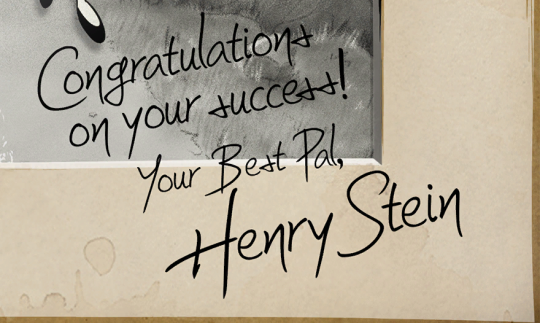
It really doesn’t sound like anything ugly happened between him and Joey. So then why are both Joey and Nathan convinced that Henry is a monster?
While I can believe that Joey is pathetic enough to consider anyone who slights him his worst enemy, Nathan comes across as a more level-headed person. So for him to voice his approval for Joey’s petty grudge must mean that he knows something that we don’t. But what could it be?
Honestly, nothing else comes to mind except for romantic heartbreak. It’s the only thing that could justify a man holding such a deep grudge for so many years. This isn’t Joey’s first friendship that grew apart over the years - his army friends have moved on with their life as well. It’s a normal part of life and there’s nothing in TIOL that would suggest Joey is unable to cope with that. We also know that the studio did fine for quite some time after Henry’s departure, so it’s not like Henry left Joey deep in debt. Henry wasn’t even the only animator at the studio:
“When the studio opened I surrounded him with artists of all skill levels, and the Writing Department had its own de facto leader in Mr. Hemmings, and so the whole of Creative was well managed for that first year of the company before I had to part ways with Henry.“ TIOL, page 155
And so we’re left with only one rational explanation: that Joey isn’t so much hurt by Henry leaving his job, as by the fact that Henry left specifically for the sake of his marriage.
Try as I might, I found no reference to Linda in TIOL. Even though Joey claims to have been friends with Henry for many years, he makes zero mention of ever having met Linda. While there are some hints that Henry wasn’t yet married to her at the time when he and Joey opened the studio together (such as the fact that he claims he hasn’t seen her in “days” even though he presumably slept at home, implying that he and Linda weren’t living together at the time. A shopping list among his notes in the Handbook also suggests that he cooked his own meals, which would be unusual for a married man with a demanding job), the two were already a couple by then, and must have known each other for a while already. Surely, as Henry’s friend, Joey would have met her?
Even when talking about Henry leaving, Joey uses a cryptic language:
“Henry left for his own reasons, and the correspondence between us became less and less. To be honest, it was almost like a weight off when he left. He had grown more sensitive as the studio became more successful and giving him pep talks had become exhausting for me. All the good qualities he brought, the hard work and diligence, were being undermined by a restless need for something different. Something that wasn't Bendy. I will never understand that drive. Bendy was and is perfection.“ TIOL, page 177
In DCTL Norman claims that Henry left to spend time with his wife. Why doesn’t Joey say that? It doesn’t make him look bad to admit that an employee left to enjoy a quiet family life. It’s almost like he refuses to acknowledge Linda’s existence at all. Like it’s too painful for him to speak of her.
Perhaps the “personal betrayal” that Nathan is referring to is related to Henry choosing a real family, over the “studio family”, and the possibility of having a real child, as opposed to a fictional one?
The symbolic image of Bendy as a child shows up multiple times in the game: for example the drawing from Henry appears to depict Bendy, Alice and Boris as a happy family, with Bendy holding onto their hands like a child would:
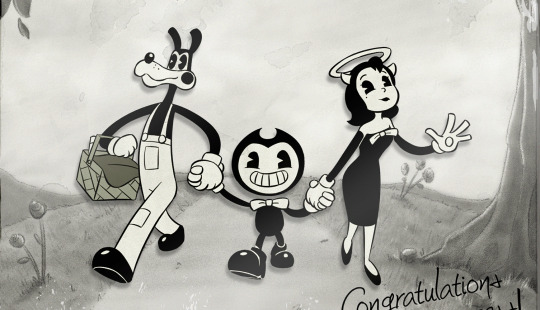
There’s also Alice using a womb imagery to describe the ink machine:

And of course, the final monologue is centered on Henry’s choice to pursue a family:

That monologue is very interesting if we assume Joey to be gay. Because a gay man would never have been able to follow Henry’s road. Gay!Joey could never choose to have a real family with a man he loved, because that option was denied to him by the homophobic society he was living in. The studio is the closest thing to a family that gay!Joey could ever hope to have.

And evidently, that was not enough for Henry.
If Joey’s indeed gay, that must have felt incredibly unfair to him - knowing that he had no chance of happiness in marital bliss from the start, through no fault of his own. This would explain his desire to create a real, living, breathing Bendy, no matter the cost, just to prove to Henry that Joey’s “child” can be just as real as the one Linda could give him.
“Bendy was Joey's child, and he felt just as strongly about Bendy as I feel about my flesh-and-blood son.“ TIOL, page 2
This idea of an illusory choice very much resembles the choice between the Angel Path and the Devil Path in Chapter 3. It’s the only choice that Henry ever gets to make in the game, yet no matter which way he chooses, he still ends up in the same corridor. Some of the golden messages highlight his helplessness:

The symbolic meaning of the choice between the Angel and the Devil also shows up TIOL. There’s a scene in the book, where Joey writes a play about an Angel and a Devil fighting over the soul of a human man. Eventually, the Devil confesses that he doesn’t want the human to make his choice, because then one of them would have to leave. The play was supposed to end with the man making his choice, but according to Joey they lacked a third actor, so the ending was never played out.
I believe that the play is symbolic of the relationship between Henry and Joey, specifically with regards to Henry choosing a relationship with Linda over his friendship with Joey.
There are several reasons that lead me to believe this:
The human in the play making a choice between the Angel and the Devil is reminiscent of Henry choosing between Devil Path and Angel path in BATIM.
The play highlights that the Devil is on the left side of the human, while the Angel is on his right side:
“ANGEL: Spending my time with a devil has been an enlightening experience. Working with you over these years with you sitting on that left shoulder, so far and yet so near, all our debates, they were invigorating for the spirit.
DEVIL: I won't miss you! Fighting all the time, trying to trick you into agreeing with me, trying to push you off that right shoulder of yours. The violence and the anger. I won't miss it at all!”, TIOL page 89
Much like the Devil Path is on the left side in the game, while the Angel path is on the right side:
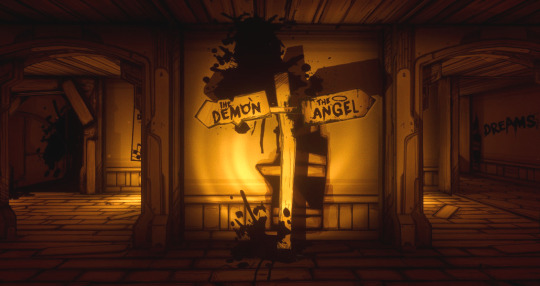
The Devil is obviously a stand-in for Bendy. Joey even dances on the stage at one point, and one of Bendy’s nicknames is “The Dancing Demon”. Joey also claims that the Devil from the play was an inspiration for Bendy:
“Let's start with the basic idea of a cartoon.You need a main character. Someone who has adventures and who the audience relates to." I did. I needed that. I needed a character who didn't just reflect the general population back to itself, but a more exciting version. I had no interest in moralizing, besides I didn't think moralizing was particularly realistic. People don't see the world as one populated by do-gooders. I thought of the angel in my play. She could never be a lead character. The devil on the other hand…” TIOL, 165
The fact that Joey claims the ending was never played out is strongly reminiscent of the missing ending of the Tombstone Picnic
It’s possible that Joey is lying about the ending not having been played out, to hide Henry’s role in the success of the play, much like he removed his part in Tombstone Picnic. After all, what would be the point of writing a play for 3 actors, when you only have 2? Why not ask someone to play the 3rd?
Although the play itself is centered more on the relationship between the Devil and the Angel, rather than their relationship with the human, there is still a strong queer symbolism in the play:
“Abby shifted nervously next to me the whole evening. She was in a dress for the first time in a long time, white and soft. I was pleased she'd come in character. For my part the only red thing I owned was a garish bow tie, so that was all I was able to contribute visually.” TIOL, page 82
The angel is played by a woman, who usually wears men’s clothing, but of course, the Angel being a symbol of Christian values couldn’t possibly be portrayed breaking the gender norms. She had to wear a dress, though Abby is clearly uncomfortable in it. She’s essentially performing heteronormative feminity. Next to her we have Joey as the Devil, dressed in a red bow tie, which as I’ve mentioned in the first part of this analysis, used to be a symbol of homosexuality.
This contrast between the uncomfortably heteronormative Angel and flamboyantly queer Devil is striking. It’s also very much in line with the views of the society in the 1920s. For something to be the symbol of purity and goodness, it has to be heterosexual, and the Devil is queer, because he’s also the symbol of sin.
That symbolism could be indicative of Joey’s own internalized homophobia. Back in his army days, his friends used to bully him for breaking gender norms. Joey likes to present himself as the hero, who was easily able to outsmart the bullies, but many of his later remarks in the book and in DCTL show that some of that attitude has left a deep mark on him.
The symbolism could also be intentional. Joey boasts about having personal ties to Noel Coward, a real life gay playwright, who was known for his many affairs with men, and for putting an ungodly amount of queer symbolism in his works:
“The old woman took a liking to me, and she was nice enough. Besides, her connections were incredible. She knew everyone, she even had the playwright Noel Coward come to stay with her whenever he was in town.” TIOL, page 144
There’s a lot of evidence pointing to the play being symbolic of Henry’s choice between his relationship with Linda and with Joey. But it’s also symbolic of Henry’s choice between Bendy, and a real child. The studio family, and a traditional family. Heteronormative relationship vs a queer relationship.
Although there’s no indication in canon that Henry might be bisexual, he doesn’t need to be. The game has beaten into our heads that the “choice” is an illusion. Henry was never going to choose the Devil, or at least that’s what Joey believes. Although we’re never told what choice the human in the play was going to make, we’re told that he was supposed to be dressed in white, which suggests that he chose the Angel.
“(The door stage right opens. A man all in white enters calmly and chooses a seat, brushes it off carefully and sits. He takes his hat off and holds it gingerly in his lap.) (Quiet.) (Curtain.) THE END” TIOL, page 91
That might be why the Devil in the play confesses that he doesn’t want the human to make his choice, fearing that one of them will have to leave once such a choice is made:
“DEVIL: You think he has made a choice?
ANGEL: It is possible.
DEVIL: Do you think he might be all bad?
ANGEL: I hope he is all good.
DEVIL: If he is all bad, my job here is done. If he is all good, you can go home.
DEVIL: Strange. If we win we also lose. You would think that would be something I would find delightful.
ANGEL: You would think I would love to make such a personal sacrifice.” TIOL, page 89
The line about a “personal sacrifice” is very interesting in this context. The Angel and the Devil clearly care for each other and for the human, and don’t want their relationship to come to an end. Though the Devil in the play seems to make gestures that the audience interprets as romantic in nature, Joey insists that it isn’t the case:
“I leaned in and placed a hand on Abby's knee. There was a gasp from someone in the audience, but I knew Abby wouldn't be flustered by it. That wasn't the nature of our relationship.” TIOL, page 89
It makes me wonder if perhaps Linda and Joey used to be friends at some point, and both competed over Henry’s attention.
There’s a much overused trope in fiction where two men compete over a woman, which ends up ruining their friendship. It would be really interesting and subversive to see a man and a woman competing over a man instead.
EDIT: I can’t believe I forgot to add this part:
"Joey, thanks for coming," said Henry, approaching from behind us. I turned to look at him He had dressed up for the event but every item of clothing looked slightly wrong. The sleeves of his shirt a bit short, his vest a bit long, his tie askew. He smiled, though, with such confidence that I couldn't help admire him. I still do.” TIOL, page 160
Joey fell for Henry’s smile, how romantic!
“We watched in silence as he worked. Despite his lack of genius, to this day, I will always say that watching Henry work was a real pleasure.“ TIOL, page 173
“It's fascinating. Henry was never the showman like I was. He didn't tend to be easily remembered by those who met him when we did business. I was invariably the face of the company, the one introduced first at a gala, the one to whom people slipped their business cards.Yet in the end he ended up setting up camp in this small corner of my memory. I can't deny that he is tied to the creation of Bendy, to the creation of the studio itself. That at one time, in one small apartment, one too warm evening, we had shaken hands. That once upon a time we had been partners. He'll always be there, in the dark recesses of my mind. Always linked to me that way. Funny how the forgettable man is now forever in my mind” TIOL, page 177
#Bendy and the Ink Machine#batim#bendy: the illusion of living#joey drew#Henry Stein#Linda Stein#dreamfisher certified#nathan arch
260 notes
·
View notes
Text
The Illusion of Living Notes and Spoilers
I feel like enough time has passed for everyone who wanted to get the audiobook to get it, so here are all the notes I made while reading the book.
Please do NOT show these spoilers to anyone who didn’t give their explicit permission to be spoiled! And do not try to sneaky-spoil while being vague and pretending you’re not spoiling either!
TIOL was written in 1941 and published in 1942
Joey’s biggest dream is to become a God
Joey is explicitly not straight (reaffirms his distaste for dating women multiple times in the book, purposely avoids intimate gestures when meeting female friends, and reacts negatively to a straight couple kissing in his presence) but can be interpreted as either gay or asexual, and there’s evidence supporting both of these interpretations
Joey doesn’t think of people as real. He thinks of them as fictional characters in a show (well, he isn’t wrong)
He witnessed a murder at 10, but isn’t bothered by it, because everyone’s fictional anyway (watsonian perspective: little sociopath, doylist perspective: smartest character in the franchise). It was on that day that he started thinking of people as characters in a play, including his own parents.
He likes to throw peanuts in the faces of vaudeville performers he doesn’t like. Very proud of his aim
Joey’s dad sends him a pair of boots every year as a gift. Joey throws them out and buys himself better ones
Though it’s implied that the stories he tells about his parents aren’t true
While in the army, he was bullied for liking girl stuff, like reading romance novels and genre fiction
Nathan and Joey are very close. Nathan often gives him business advice and knows some of his secrets. Nathan looks down on artistic-type people. Joey is the only artistic-type person he admires, mostly for being business-oriented. Nathan is all about money.
Nathan wears a suit, has perfectly slicked back hair, and an elegant mustache. Smokes Cigars. Calls himself Nate
Nathan says that Lottie (the girl from the preview) isn’t real. It’s implied that there are more made-up people in the book. The epilogue implies that Joey intends to bring the made-up people to life one day, just like the cartoons
After leaving the army, and before starting an animation studio, he worked at a bookstore together with Henry for a few years
He took late-night art classes together with Miss Lambert
Bendy was named after Joey’s friend, who murdered a man to take a photo of his dying face for an award show. Joey finds it inspiring. In his words: "Thank god for dark paths, they lead all great artists to their greatest creations". Joey also likes the name Bendy, because it means someone who bends the rules
Nathan says that Joey had a genuine change of heart in his old age, and had “too much guilt and worry”. Nathan is not pleased with that
Abby Lambert is one of Joey’s oldest friends, and the one who introduced him to Henry. She and Joey used to perform vaudeville acts together. Joey played a Devil and Abby played an Angel
It’s implied that Henry created the Butcher Gang, and they were some of his oldest characters, even older than Bendy, Boris, and Alice
Henry left a year after the studio’s creation because he wanted “something that isn’t Bendy” (it’s either that he felt like his creativity was being stifled by being forced to work on the same project all the time, or that he wanted a real family, as opposed to the “studio family” that Joey was satisfied with)
Joey disses Henry a lot in the book. He paints him as untalented, unimaginative, boring, and a poor dresser on top of that. Nathan thinks that pretending to not care about Henry is Joey’s “greatest illusion”
Nathan hates Henry and thinks that Joey’s going too easy on him (if BATDR is Nathan’s world, Henry’s gonna be screwed)
Sammy used to play music at a movie theatre when he was a teen and Joey came to watch his performance every day
They met again a few years later and Sammy recognized him. Joey hired him and Jack on the same day
Sammy smokes
Sammy and Jack performed jazz songs at vaudeville together for some time before working at JDS
Jack gets upset when people ignore him and only pay attention to Sammy. He loves being the center of attention, and has a knack for showmanship. Very optimistic and good natured
Sammy was hired a year after Henry’s departure and has never met him (curious, given that he recognizes Henry in the game) Not true - turns out Sammy was hired in October 1930, so he still could’ve met Henry
As part of his deal with Joey, Sammy has full creative control over his department and people he’s working with (did Sammy replace Susie?)
Sammy hates being at the center of attention and is always very serious. Making jokes comes hard for him, but he plays along sometimes. His expression is very hard to read and he always seems suspicious of people he’s talking with. He’s dressed very neatly and appropriately (unlike Jack, who wears bright and flashy clothes), his hair is long and not slicked back. He’s a few years younger than Joey, but acts much older
Joey thinks that Sammy is his best decision and the man who comes closest to fully understanding him. He takes pride in the fact that Sammy sticks by him for all these years out of his own will, and not because Joey makes him. He thinks Sammy is a genius and deserves to be worshipped like a god (he doesn’t hesitate to tell him that). Asked him once whether there’s anyone Sammy worships, and it’s painfully obvious that he wanted to hear that it’s him (Sammy replied that a god of this magnitude hasn’t been invented yet, which is a nice foreshadowing)
Allison is already working at the studio at the time of TIOL. Before that, she was a Broadway actress. Joey likes to watch her recording sessions. It’s not confirmed which character she’s voicing, but Susie wasn’t mentioned anywhere in the book, so there’s a possibility that Allison was already voicing Alice Angel in 1941
Joey’s meetings with Jack Fain and Grant are just an excuse to have a coffee and chat with them
On his first meeting with Bertrum Joey got drunk and flirty with him. Bertrum told him he’s “not that kind of date” and Joey played dumb (the scene is played for laughs though, so idk if it’s supposed to be seriosuly indicative of Joey’s sexuality)
Bertrum returned from retirement to work on Bendyland
Disney exists in this universe, Joey wishes he could be able to achieve the same with Bendy
Nathan wants to prove “very soon” that he is limitless
The moving ink was developed as part of the Sillyvision film process at some point around 1941. The purpose of Sillyvision was to make corrections to images that have already been created, without having to redraw them from scratch. The ink is activated through contact with a special paper
Joey describes Bendyland’s conception, and the Dark Land sounds eerily similar to the studio world in BATIM & BATDR
Light Land is Alice’s Domain, and as the name suggests it will have many lights. It’s designed to create an illusion of being lifted up
Tiny Land is Boris’ Domain and it gives an illusion of getting shrunk
Big Land is Butcher Gang’s Domain and has giant airplanes and battleships
Joey hates the real world and wants to escape to a make-believe one. He was hoping Bendyland would be that for him. His greatest fear is being unable to create that perfect world, and creating only its dark reflection (ironic)
Joey feels like he won’t be able to truly die and rest his soul until his dream fully comes to life. He calls art his “doorway into immortality” (is Dapper Joey?)
Joey believes a soul is needed to make a lifeless artistic imitation of the world into a real breathing world. He says that he’s been looking for a soul for a long time (he means it metaphorically, but it feels like a foreshadowing)
#Bendy and the Ink Machine#batim#bendy and the dark revival#batdr#bendy: the illusion of living#dreamfisher certified
216 notes
·
View notes